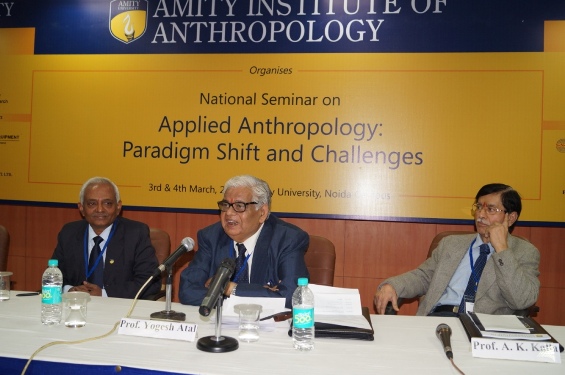03 Mar 2014-04 Mar 2014|Noida | Amity University Campu, Sector-125 Noida
National Seminar on “Applied Anthropology: Paradigm Shift and Challenges" organised by Amity Institute of Anthropology

Amity Institute of Anthropology commenced a two day National Seminar on “Applied Anthropology: Paradigm Shift and Challenges” at Amity Campus, Sector- 125, Noida.
The seminar is aimed at bringing together nationally and internationally renowned scientists and young scholars to discuss the latest developments, trends, and applications of Anthropology and allied subjects.
Prof. Yogesh Atal- UNESCO’s Former Principal Director of Social Sciences, Prof. A K Kalla- UGC Emeritus Professor, Dr. D K Bhattacharya- Retired Professor, Department of Anthropology, University of Delhi and Dr. W Selvamurthy- President, Amity Science Technology and Innovation Foundation inaugurated the National Seminar.
Welcoming the august gathering, Dr. Roumi Deb-Assistant Director, Amity Institute of Anthropology highlighted various achievements of the Institute including meaningful, welfare oriented and result driven research carried out by the researchers focusing on tribal population of North East India and other socio –cultural aspects. She expressed her hope that the Seminar would pave a platform for all the participants to draw upon an understanding of the Biological, Social, Archaeological, Historical, Psychological, Ecological, Economic, Social and Cultural dimension of the human beings and their existence on this planet.
Delivering the inaugural address, Prof. Yogesh Atal- UNESCO’s Former Principal Director of Social Sciences shared his views on “Ethics in Research and Research on Ethics”. He outlined that Anthropology grew as a federating discipline incorporating methods and theories from various social and biological specialties but growing specializations created schisms between social and physical anthropology. “Physical Anthropology came closer to human biology and grew at the cost of holistic approach that was the distinguishing aspect of Anthropology. In this separation, culture was ignored and narrow specialization obscured the basic goal of the discipline,” lamented the distinguished speaker. He further shared that now with increasing possibilities of application of research advances, the government and International community insisted on rigid adherence to ethical norms, which has brought back the cultural aspect of Anthropology. Prof. Atal expressed that while Anthropology grew as a study of the “past” and the “primitive”, it has rightfully extended its scope to cover not only the “present” but also the “Future of Mankind”.
Sharing his views, Prof. V K Srivastava- Head, Department of Anthropology, University of Delhi said that anthropology as a discipline started in a particular context, looking at the evolution of human beings and society. It is a long, sustained field of study and suggested that it should not be limited to pure theoretical knowledge but also encompass the practical aspects. He stressed that Anthropology could be used to solve problems in numerous fields such as Health and Medicine, Business, Human rights, Education, Environmental issues, Community development etc. He shared four kinds of researches that have come to existence with the evolution and growth of Anthropology including “PURE Research”, “APPLIED Research”, “POLICY Research” and “ACTION Research” and implored the researchers and scientists to use the knowledge and research in anthropology for human amelioration. He suggested that in order to produce good anthropology research, every anthropology Institution should work on the concept of “Integrated Anthropology which includes biological, Social, Archaeological, Historical and other important aspects”; it should have a Museum and a Laboratory for in depth study and adequate funds for field work. He remarked that the study of Anthropology makes people tolerant, good listeners with appreciation for diversity and plurality. He opined that the language in which anthropology texts are written should be easy, concise and without any technical jargons to enable people from other disciplines to comprehend the texts. “The actual aim of Anthropology should be to reach out to people and educate them.” implored Prof. Srivastava.
The inaugural was followed by Oral Presentations by Research Scholars and Scientists from Delhi University and Amity University including Ms. Lovejeet Kaur- Research Scholar, University of Delhi on “Disturbed Immuno-modulation in Pre-eclampsia”, Ms. Seerat- Research Scholar, University of Delhi on “Role of one carbon metabolites and MTHFR C677T Mutation in the causation of recurrent pregnancy loss”, Ms. Arti Srivastava- Research Scholar, Amity Institute of Biotechnology on “Heavy metal toxicity in Aquatic Environment” and others.
During the day, a Plenary Session on “Anthropology and Tribal Cultural Heritage, Health and Welfare”, Lectures by Invited speakers and Poster Presentations witnessed discussions and deliberations upon various aspects of Anthropology by experts, Scientists and Research Scholars.